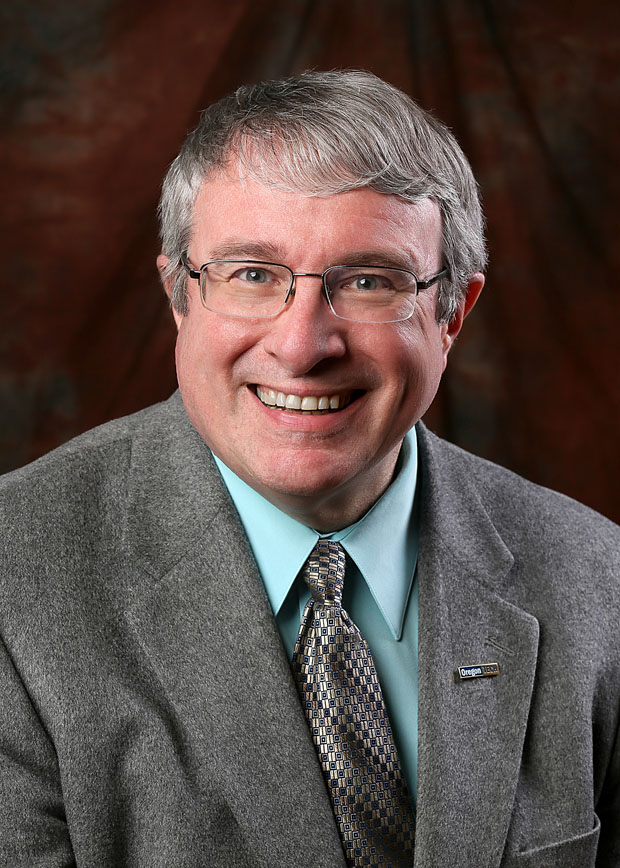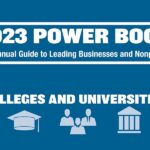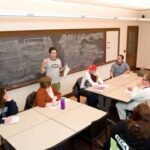A conversation with Chris Maples, president of the Oregon Institute of Technology.
Christopher Maples is president of the Oregon Institute of Technology, the only public institute of technology in the Pacific Northwest. Maples talked to Oregon Business about how to make higher education more affordable and what Southern Oregon needs to do to encourage graduates to stay in the area.
Our biggest challenge
High-cost programs. We also have low enrollment. We are around 4,400 students, so [finding] that balance between the tuition, the state support, the number of students that we have. Plus, almost 70% of our student population is Pell eligible — they are economically challenged. Collectively, that crowd takes a little more time to get done. Our challenge will be providing a really high-quality product at a price that people can afford.
Impact of declining public funding
There has been a disinvestment in public education in Oregon for many years. That said, this past session was terrific. Higher education got more than we expected. But one good rain doesn’t end a drought. We have put ourselves in a really deep hole over years and years of disinvestment. [The] commitment has to continue now for several biennia in order to get us back to where we need to be.
How to improve affordability
Students incur most of their debt their junior and senior year and perhaps a fifth year. This is when scholarships tend to drop off. There is a lot of money to get people in the door, but not a lot of sustaining money to keep them going. What we are going to do is focus really hard on resources internally to help our students graduate, obtain their degree and be able to get into positions where they can pay off whatever loans they have.
How the market determines our curriculum
Our majors and programs have industry advisory boards. We ask: What is coming in GIS and surveying? What is the next hot thing in electrical engineering? It was because of that that we ended up with the nation’s first renewable-energy engineering degree.
We are looking at lengthening degrees but in ways that you get value added. We will have, for instance, a “four plus one” in which you will end up with a master’s degree at the end of five years. Or “four plus one” in which you end up with two separate bachelor’s degrees. This is a value proposition as much as affordability: Are you getting what you are paying for? Are you getting a degree you can parlay into a living? That is the most important set of questions anyone could ask.
New programs on offer
I would love to have a doctorate of physical therapy at the Klamath Falls campus. What I see coming is a lot of professional health care — the M.D.s and general practitioners — there are fewer of those types of people out there. There will be more nurse practitioners, physician assistants that will be required to take on this broad swath of preventive care.
How you achieve a high graduate success rate
We really have programs that are in need. It is in the mission of what we do as a polytechnic. Engineering, high tech, healthcare — those are all in need. By having these industry advisory councils, we try to upgrade and adjust to fit industry requirements and industry needs. We also try to be very hands-on and applied in how we do it. We make people understand theoretical concepts.
The trend toward IT students ditching four-year degrees in favor of online courses
We went through this in the past before the economic downturn. Some students in computer information technology and computer systems would get into a program and get lured into Silicon Valley and other places for some high-paying jobs. All we can say is, if you want to advance in a company, having this degree will help you do it. At some point you are going to be doing more than coding. You are going to be doing more than putting together an app; you are going to manage people. They are going to want to have someone who has had that broader educational experience and who has learned to problem solve and think creatively.
Job prospects for graduates in Southern Oregon
There aren’t as many that stay in the Klamath Falls area as we would like. There are limited health care options. It is the same with dental hygienists. In terms of the high-tech, engineering, computer systems crowd, they often end up in larger cities with lots of startups and lots of opportunities. So they will end up in the Silicon Forest, in Portland, in the Seattle-Tacoma area, in the Bay Area.
How to make graduates stay
The main thing that is different today is student debt. There is a tendency to be appropriately concerned about being able to [pay] and be worried that you won’t have enough time to get a business up and running. So we see a lot of people leave the state for more predictable employment with established companies. To get people to stay would be a modest investment, frankly. Assume the average student debt is $30,000. That amounts to $3,000 to $4,000 a year for the student to pay back. If you took 10 people and formed a local board — you could have a town, city council, chamber of commerce invest $30,000 to $40,000 a year for 10 of those people, paying their first year, two or three. You have to have one out of those 10 stick and surely pay back more than that in taxes.
How the engineering profession is changing
A lot of technology is being acknowledged now as doing societal good. There has been a lot of engineering in the past that emphasized building great big things and blowing stuff up; now we are trying to bring clean drinking water into areas that don’t have it, we are trying to bring power into areas that have no power. That appeals to a broader suite of people. Civil engineering and renewable-energy engineering in particular are attracting more women. There is a better understanding of what that can do for society and for people.
| PRIVATE UNIVERSITIES AND COLLEGES RANKED BY FULL-TIME ENROLLMENT | ||||||
| RANK | NAME / WEBSITE | ADDRESS / PHONE | PRESIDENT / SENIOR EXEC | FALL FTE / HEADCOUNT | UNDERGRAD / GRADUATE DEGREES | PROGRAMS |
| 1 | Concordia University-Portland | 2811 N.E. Holman St., Portland (503) 288-9371 | Charles Schlimpert | 7,435 7,435 | 212 2,119 | Education (M. Ed, Ed.D.), business (MBA), health care, nursing, homeland security |
| 2 | University of Portland | 5000 N. Willamette Blvd., Portland 97203 (503) 943-8000 | Rev. Mark L. Poorman | 3,724 4,123 | 857 219 | Schools of business, education, engineering, nursing, College of Arts & Sciences, Graduate School |
| 3 | Pacific University | 2043 College Way, Forest Grove, 97116 (503) 352-6151 | Lesley Hallick | 3,440 3,667 | 373 539 | Liberal arts, sciences, optometry, education, pharmacy, clinical/counseling psychology, physical therapy, occupational therapy, physician’s assistant, dental hygiene, exercise science, speech-language pathology, audiology. |
| PUBLIC UNIVERSITIES RANKED BY FALL FULL-TIME ENROLLMENT | ||||||
| RANK | NAME / WEBSITE | ADDRESS / PHONE | PRESIDENT / SENIOR EXEC | FALL FTE / HEADCOUNT | UNDERGRAD / GRADUATE DEGREES | PROGRAMS |
| 1 | Oregon State | 600 Kerr Administration Bldg. Corvallis 97331 541-737-4133 | Edward J. Ray | 24,825 28,886 | 4,702 1,189 | Agricultural science, business, education, engineering, forestry, health/human science, liberal arts, oceanic/atmos. sci., pharmacy, science, vet. med., honors college |
| 2 | University of Oregon | 1226 University of Oregon Eugene 97403 541-346-1000 | Michael Schill | 22,832 24,181 | 4,654 1,230 | Architecture, biology, business, chemistry, computer and information science, economics, education, English, environmental and natural resources law, human physiology, journalism, marine biology, physics, psychology, sports business |
| 3 | Portland State | P.O. Box 751 Portland 97207 503-725-3434 | Wim Wiewel | 20,366 28,931 | 4,375 1,665 | Business administration, education, engineering and computer science, fine/performing arts, social work, urban/public affairs, environmental science |
| COMMUNITY COLLEGES RANKED BY FALL FULL-TIME ENROLLMENT | ||||||
| RANK | NAME / WEBSITE | ADDRESS / PHONE | PRESIDENT / SENIOR EXEC | FALL FTE / HEADCOUNT | UNDERGRAD / GRADUATE DEGREES | PROGRAMS |
| 1 | Clark College | 1933 Ft. Vancouver Way Vancouver, WA 98663 360-992-2000 | Robert K. Knight | 8,484 12,268 | 2,737 N/A | Dental hygiene, nursing, mechatronics |
| 2 | Portland | P.O. Box 19000 | Sylvia Kelley (acting president) | 8,300 31,000 | 5,000 N/A | College transfer, career/technical education, pre-college math/reading/writing, ESOL, community education, workforce development |
| 3 | Lane | 4000 E. 30th Ave. Eugene 97405 541-463-3000 | Mary Spilde | 6,726 9,236 | 1,336 N/A | Professional, technical, college transfer, skill upgrading, business, life skills and personal development, career enhancement, cultural/community services |
{jumi [/includes-for-articles/Powerbook-PLUS-2012-pitch-wide.html]}





